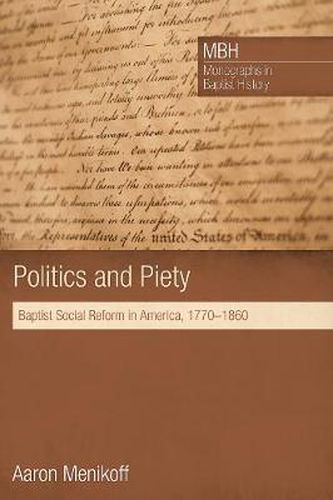Readings Newsletter
Become a Readings Member to make your shopping experience even easier.
Sign in or sign up for free!
You’re not far away from qualifying for FREE standard shipping within Australia
You’ve qualified for FREE standard shipping within Australia
The cart is loading…






This title is printed to order. This book may have been self-published. If so, we cannot guarantee the quality of the content. In the main most books will have gone through the editing process however some may not. We therefore suggest that you be aware of this before ordering this book. If in doubt check either the author or publisher’s details as we are unable to accept any returns unless they are faulty. Please contact us if you have any questions.
Historians have painted a picture of nineteenth-century Baptists huddled in clapboard meetinghouses preaching sermons and singing hymns, seemingly unaware of the wider world. According to this view, Baptists were so heavenly-minded, they were of no earthly good. Overlooked are the illustrative stories of Baptists fighting poverty, promoting abolition, petitioning Congress, and debating tax policy. Politics and Piety is a careful look at antebellum Baptist life. It is seen in figures such as John Broadus, whose first sermon promoted temperance, David Barrow, who formed an anti-slavery association in Kentucky, and in a Savannah church that started a ministry to the homeless. Not only did Baptists promote piety for the good of their churches, but they did so for the betterment of society at large. Though they aimed to change America one soul at a time, that is only part of the story. They also engaged the political arena, forcefully and directly. Simply put, Baptists were social reformers. Relying on the ideas of rank-and-file Baptists found in the minutes of local churches and associations, as well as the popular, parochial newspapers of the day, Politics and Piety uncovers a theologically minded and controversial movement to improve the nation. Understanding where these Baptists united and divided is a key to unlocking the differences in evangelical political engagement today.
$9.00 standard shipping within Australia
FREE standard shipping within Australia for orders over $100.00
Express & International shipping calculated at checkout
This title is printed to order. This book may have been self-published. If so, we cannot guarantee the quality of the content. In the main most books will have gone through the editing process however some may not. We therefore suggest that you be aware of this before ordering this book. If in doubt check either the author or publisher’s details as we are unable to accept any returns unless they are faulty. Please contact us if you have any questions.
Historians have painted a picture of nineteenth-century Baptists huddled in clapboard meetinghouses preaching sermons and singing hymns, seemingly unaware of the wider world. According to this view, Baptists were so heavenly-minded, they were of no earthly good. Overlooked are the illustrative stories of Baptists fighting poverty, promoting abolition, petitioning Congress, and debating tax policy. Politics and Piety is a careful look at antebellum Baptist life. It is seen in figures such as John Broadus, whose first sermon promoted temperance, David Barrow, who formed an anti-slavery association in Kentucky, and in a Savannah church that started a ministry to the homeless. Not only did Baptists promote piety for the good of their churches, but they did so for the betterment of society at large. Though they aimed to change America one soul at a time, that is only part of the story. They also engaged the political arena, forcefully and directly. Simply put, Baptists were social reformers. Relying on the ideas of rank-and-file Baptists found in the minutes of local churches and associations, as well as the popular, parochial newspapers of the day, Politics and Piety uncovers a theologically minded and controversial movement to improve the nation. Understanding where these Baptists united and divided is a key to unlocking the differences in evangelical political engagement today.